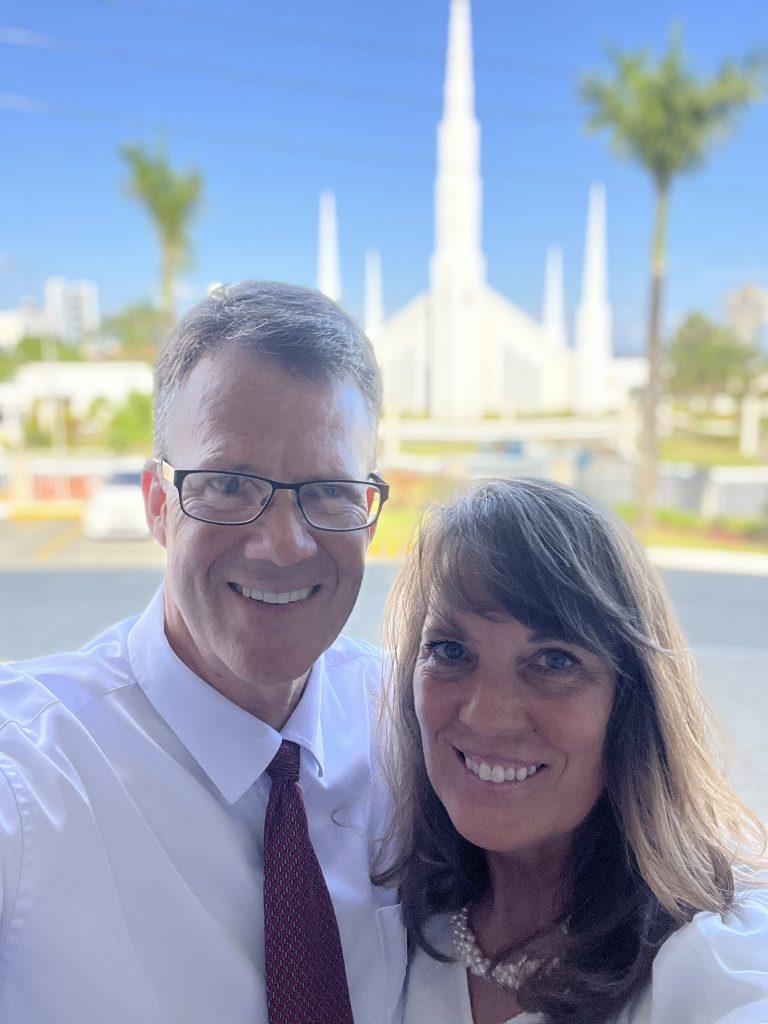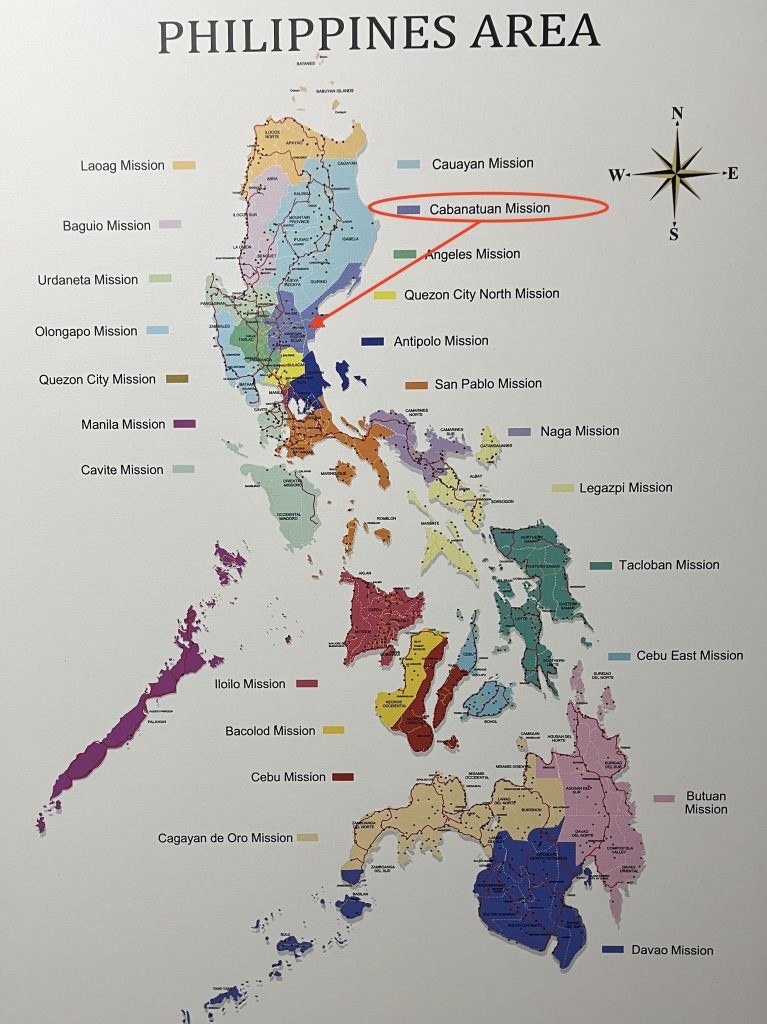One of the highlights of our calling is to interview soon to be released and mission leaders that have already been released and having them share insights and experiences they had during their service as mission leaders in the Philippines.
To review, mission leaders (formerly referred to as mission presidents), served for three years. They are generally a couple in the forties or fifties, and rarely some are even in their sixties, if they are called from outside of the Philippines. However, Filipino couples that serve as mission leaders are often in their late thirties or early forties and still have children in their home. Leadership opportunities come at a much younger age for Filipinos than for those from North America or other countries. A mission leader is a demanding calling and is a full time 24/7/365 responsibility for three exhausting years.
Each of these mission leader interviews, have unique and interesting stories and experiences. I would like to share a few stories of the Burton’s who will be released and return home at the end of July of 2024.

President and Sister Burton, Cabanatuan Mission, 2021-2024
President Burton was a career U.S. Naval Officer. In the exploratory interview with Apostle Rasband, many of the questions he was asked were focused on his naval experience. Interestingly, his experience in church leadership was not extensive. In fact, as the interview ended, he asked Elder Rasband if he was concerned that he had never served in significant leadership positions such as in a stake presidency. The reply was priceless, at least for me. Elder Rasband told him that he had not served in a stake presidency either and then said, “Does that answer your question?”
While the Burton’s were stationed in Louisiana, they served in a Vietnamese branch. There was a lot of discussion in this exploratory interview about his experiences in the Vietnamese branch. Both of them shared with Elder Rasband how much they enjoyed working with the Vietnamese people.
After the interview finished, as with all exploratory interviews of this nature, couples are told that they may never hear from anyone about a mission call and if they do, they will not initially know where they will be called to serve. When they did receive their mission call letter in late November 2020, they were informed that they would be called as mission leaders and that their area of service assignment would be made in March of 2021. Based on how the initial interview had gone, President Burton thought that they may be assigned to serve in Vietnam.
Much to their surprise, when their assignment came, they were called to serve in the Philippines Cabanatuan Mission. The Cabanatuan Mission office is a four-to-five-hour drive northeast of Manila and is considered a provincial mission – meaning it is a rural area where most of the population are farmers and fishermen.

The Philippines Mission Map – twenty three missions with three more missions to be added in July 2024. The red arrow point to the light purple shaded area of the Cabanatuan Mission
When they arrived in the mission, the U.S. was largely coming out of the pandemic, but that wasn’t the case in the Philippines. After arriving in Manila, they were quarantined for ten days in a hotel and then quarantined another four days after arriving in Cabanatuan. Each province had their own criteria on quarantines. Almost universally all provinces were generally very restrictive on travel between cities and definitely between provinces.
In March of 2020, all foreign missionaries had been sent home throughout the world leaving only Filipino missionaries serving in the Philippines and they weren’t allowed to leave their apartments because of the pandemic restrictions on in-person contact.
In situations like the pandemic, there often are silver linings that emerge from these types of difficult situations. One notable blessing during the pandemic for Filipinos, who by culture and disposition, are shy and reserved, and because of this shyness don’t often get as many leadership responsibilities as their foreign companions. When serving as companions with a foreigner, mostly Americans, Canadians, New Zealanders, or Aussies, they often take a back seat because of their shyness letting their companions take the lead. However, when all the foreigners left the country, that changed and these Filipino missionaries were asked to step up and lead out – which they did. There are scads of stories of how well the Filipinos rose to the occasion.
Another blessing was that since few people were working, the breadwinner had to remain home quarantined along with their families. Interesting, after teaching moved from face-to-face meetings to online meetings, baptisms continued with one significant difference, more families were being baptized vs. individual members of a family because the breadwinner of the family was home and could be taught (albeit online) together with his family.
Because of the pandemic, it was especially for a new mission leader arriving because their predecessor had already left the country. The Burton’s walked into their mission office knowing absolutely nothing. Traditionally, the existing mission leaders helps with a transition but in this case, it was baptism by fire because as new mission leaders that don’t speak the language, with no existing staff in the office they have all left when the pandemic hit, the Burton’s had to rely on two young nineteen and twenty-year-old Filipino Assistants to the President to help them figure things out. The good thing, from a new mission leader’s perspective, is that the total number of missionaries had dropped from 160 to 50, after the foreigners were sent home, so from a quantitative standpoint, the number of missionaries was much more manageable.
Now, visualize this….you are new to the country, you are responsible for the safety and care of 50 missionaries, you don’t know the language (and there are three dialects spoken in your mission), you don’t know where to shop for food or medicine, you haven’t and can’t meet the missionaries in person, and you have to figure out how to be a mission leader while everything else is going on. This is where their experience in the Navy, having moved frequently and being familiar with new environments came in handy.
President and Sister Burton shared an insightful comment in our oral history interview that it was a miracle that the work of the Lord managed to continue to move forward under these circumstances. They both shared their belief that the First Presidency was inspired to start the transition of incorporating technology into missions around the world prior to the onset of the pandemic. Having technological platforms in place as the pandemic spread around the world allowed online teaching and church meetings broadcast to be able to be used months before the pandemic hit. Without this, it would have been difficult for missions like the Cabanatuan Mission to function as well as they did.
One of the things the Burton’s started to do after the Covid restrictions began to be lifted was to go out with the missionaries on teaching appointments and on service projects in the community. They also visited families the missionaries had been teaching. They also taught their missionaries by example working shoulder to shoulder on service projects with families that were being taught. They truly walked the walk and talked the talk leading by example.
When asked about some of the challenges Filipinos face when they were considering joining the Church, they shared that the marriage situation in the Philippines was a huge issue. As mentioned in prior blog posts, there is no divorce in the Philippines. The Philippines is one of the only countries in the world to have a no divorce policy. When either a man or woman in a marriage decided the marriage wasn’t working, they would simply leave and often start a new family without getting married.
Also, in poorer rural areas, getting a marriage license is relatively expensive when taken into the context of the income of the people that earn only a few thousand Filipino pesos a month. For example, a marriage license is P10,000 or about $172 U.S. I think I paid $25 for our marriage license (I checked online, and a marriage license is now $81 in Oakland, CA where our marriage license was issued). It’s crazy to think that a marriage license in the Philippines is more than double of what is costs in the U.S., especially where a week’s income often barely covers the cost of a marriage license. This often resulted in people not formally getting married and just set up a houshold.
The inability to get a divorce and the cost of getting married in the Philippines often leads to unintended consequences. This often turns out to be a mess when a humble, sincere person accepts the gospel but isn’t married but has a family or sometimes two families. The accommodation made in this situation is that if a person has been with a partner for more than five years and can get married, they do. If they are meeting all of their family obligations, this is deemed acceptable, and they are allowed to be baptized and join the Church.
Contacting
I’ve heard of a lot of different contacting methods used in missions around the world but the one the Burton’s shared with me was one that I hadn’t heard about. This contacting strategies used in Cabanatuan Mission was to use the Book of Mormon – Another Testament of Jesus Christ in finding people to teach. Since Christ our Savior is mentioned an average of 1.7 times on each page of the 500+ pages of the Book of Mormon, the missionaries when meeting and talking to people they would explain, “Every page of this book testifies of the Savior and teaches of Jesus Christ. Will you open the Book of Mormon and just start reading?”
The people would open the Book of Mormon and begin reading. When a reference to Christ was noted, the missionaries would talk about that scripture. After this short interchange, people would start to give the book back and the missionaries would say, “This is our gift to you. Will you read about Jesus Christ every day?” The people would agree to do this and if the people were willing, the missionaries would get their contact information. If not, the missionaries would thank them for their time and leave. In many cases they were able to begin teaching these people about what they read about Christ in the Book of Mormon. When speaking of Christ, this resonated the Filipino people because of their deep and abiding faith and belief in Christ.
At the conclusion of this oral history interview, and in other mission leader interviews, I have seen how the hand of the Lord guides these mission leaders and have observed how they leverages their unique talents and abilities in situations that require not only insight but special managerial skills and inspiration to deal with uncertain situations on the fly and to do this 24/7 for three years.
In President and Sister’s Burton’s case, their Navy background of having to move to a new location or country frequently and often on a moments notice, dealing with uncertainty, and being able to think clearly under pressure was a blessing not only to the missionaries that they were entrusted to watch over, but to the local leadership as well. The Burton’s went out of their way to make special efforts to train local leaders as the mission grew by laying the foundation for the ability for the church leadership to support the growth now and in the future.
What I continue to learn about the Philippines…..
A few months after we arrived in the Philippines and after a day’s work in the field, we would drive home. At a busy intersection on our way home, we frequently were approached by young girls who sell local white flowers that were carefully strung together into a neckless-like string of flowers which most people hang on their rear view mirror. When the light turned red and cars had to stop, they would approach stopped cars hoping to sell their flowers. We have mentioned them in another blog post.
These girls are part of a family that apparently makes a living at this intersection. Most of the time we see these girls around five or six o’clock but this one evening it was 8:45 pm and to our surprise, one of these young ladies was out working the intersection at this late hour.

Jasmine – Age 11
My heart breaks to think that for at least the next four or five years most days (after school) and evenings, Jasmine and her friend Joy and their brothers will be out working by selling their flower to support their family. As we drove away and I looked in my rear view mirror, seeing her hurry out of traffic waiting for the light to turn red again. As we made the turn at this intersection for home, I couldn’t but think of our grandchildren that are Jasmine’s age and the difference in opportunities our grandchildren will have that Jasmine and her siblings will not have.
Scriptural Thought:
1 Nephi 20:10: “For, behold, I have refined thee, I have chosen thee in the furnace of affliction.”
Thought of the Day: In coming days it will not be possible to survive spiritually without the guiding, directing, comforting, and constant influence of the Holy Ghost. President Russell M. Nelson
